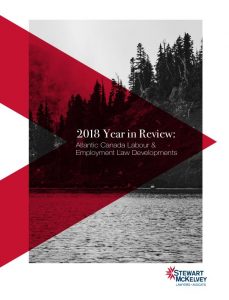2018 Year in Review: Atlantic Canada Labour & Employment Law Developments
We can all make 2019 a success by building on the year that was. For employers, 2018 was a year of many notable developments in labour and employment law across the country. We saw Ontario enact significant legislative changes only to roll many of them back following a turnover in government; the federal government propose significant changes to its own legislation; the #metoo movement march forward; and the legalization of cannabis put its workplace impact in the spotlight.
Atlantic Canada experienced a number of its own legal developments that regional employers should be aware of as they plan for the year ahead. Click the image below to read our 2018 Year in Review, where lawyers from the Labour & Employment practice group recap notable legislative and case law updates from each of the four Atlantic provinces.
Archive
By Alanna Waberski and Isaac McLellan On September 21, 2022, the Government of New Brunswick released its renewed climate change action plan which aims to help the province adapt to climate change while steering New…
Read MoreCourt upholds mandatory vaccine policy – Placing employee on unpaid leave not constructive dismissal
Mark Tector and Ben Currie While there have been a number of arbitration decisions on the subject, Parmar v Tribe Management Inc., 2022 BCSC 1675 appears to be the first reported civil court decision to…
Read MoreSadira Jan, Dave Randell, and James Gamblin Nova Scotia (“NS”) and Newfoundland and Labrador (“NL”) are positioned to become international leaders in offshore wind and green hydrogen. Each province has expansive offshores areas, abundant wind…
Read MoreKevin Landry and Nikolas Shymko The Cannabis Act came into force on October 17, 2018, putting in place framework for controlling the sale, possession, production and distribution of cannabis. The Cannabis Act requires the Minister…
Read MoreBrendan Sheridan and Brittany Trafford. Many events and workplaces started to feel more normal over the summer as we emerged from over two years of restrictions and COVID-19 pandemic precautions. However, as people line up…
Read MoreBy Level Chan and Shaniqwa Thomas The Canadian Association of Pension Supervisory Authorities (CAPSA) has extended its deadline for submissions to October 14, 2022 on the following draft guidelines: Approach to Risk Management Guideline; Environmental,…
Read MoreBy Nancy Rubin, K.C. and Levi Parsche What happens if a person accidentally makes payment to a hacker, instead of to the person they actually owe money? Should they have to pay again? In the…
Read MoreG. Grant Machum and Ben Currie On Tuesday, September 13, 2022, Prime Minister Justin Trudeau declared a federal holiday on Monday, September 19, 2022 to honour the death of Queen Elizabeth II. Minister of Labour…
Read MoreKevin Landry, Matt Jacobs Shareholder agreements are a key part of corporate governance. Nova Scotia is unique from other Canadian jurisdictions because the Companies Act (Nova Scotia) doesn’t contemplate ‘Unanimous Shareholder Agreements’ as other corporate…
Read MoreBy Kathleen Leighton Last year, Canada boasted record admissions of permanent residents, despite the COVID-19 pandemic, and has an even more ambitious target for 2022 – namely, to welcome 431,000 permanent residents to the country.…
Read More